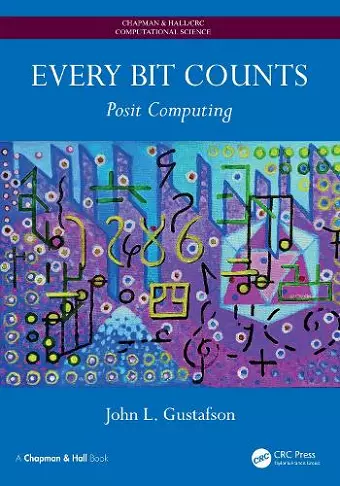Every Bit Counts
Posit Computing
Format:Paperback
Publisher:Taylor & Francis Ltd
Published:29th Nov '24
Currently unavailable, our supplier has not provided us a restock date

This book explores a groundbreaking method in computing, Every Bit Counts, highlighting the benefits of posit computing for efficiency and performance.
Written by a leading expert in high-performance computing, Every Bit Counts delves into a revolutionary computing method known as posit computing. This innovative approach enhances how computers perform calculations by efficiently packing more information into each bit, resulting in significant savings in time, storage, energy, and power compared to traditional methods. The author, who is also the inventor of Gustafson’s law, presents a compelling case for the advantages of this new paradigm, which is gaining traction in both the AI and HPC communities since its introduction in 2017.
The narrative of Every Bit Counts is not merely technical; it also weaves in the human and historical context of numerical representation in computing. By doing so, the author transforms what could be a dry subject into an engaging exploration. The book is richly illustrated in full color, making complex concepts more accessible and enjoyable to read. Humor is infused throughout, ensuring that readers remain captivated by the material.
Beginning with foundational ideas, the chapters progressively introduce more complex concepts, adhering to clear mathematical and engineering design principles. This structured approach equips readers with a comprehensive toolkit for developing application-specific number systems. Additionally, the book offers an in-depth discussion of the Posit™ Standard (2022), complete with motivations and examples that elaborate on the original document’s concise information.
“John Gustafson is a masterful storyteller. The Every Bit Counts book takes on a seemingly dull topic – representation of numbers in computers, and makes it fascinating. Amusing at times, clear and pointed, with examples and illustrations, Gustafson critiques the state of the art and sheds light on its flaws, while showing the reader how we got here. But the real beauty of the exposé is the proposed alternative. Full of fresh ideas, new to anyone outside the ‘numbers standard’ community, the author presents a new and superior solution that revolutionizes the stagnant state of how our computers do arithmetic. Not an academic exercise, The Posit Standard is gaining acceptance in the industry. A must-read for anyone interested in how we compute for HPC and AI.”
-- David Barkai, Author of Unmatched: 50 Years of Supercomputing
“This book is a landmark work and breaks ground in the critical area of the future numerics of computing. Of greatest importance is that it finally fully exposes the gross limitations of conventional IEEE 754 floating point which reflects the ad hoc nature of its creation from its beginning to its current realization. If nothing else were to be derived from this work, burying 754 would be a major accomplishment. Gustafson’s contribution will stand for time without end or until something derived from unums and posits etc. are fully embraced and assumed by all practitioners without further thought. A critical aspect of the 13 chapters is the many areas yet to be fully explored in different regimes of application as repeatedly discussed by the author. It is pleasing to note the many credits proscribed to the many contributors over the years that have been cited by John throughout the work. This book will become required reading by the thousands of students and engineers who will derive foundational benefit for future computing methods based on this book. It makes a rare first-order contribution to the expansive nature of the field.”
-- Thomas Sterling, Ph.D, Senior Research Scientist at Texas Advanced Computing Center
“In his new book Every Bit Counts: Posit Computing, John Gustafson offers a radical re-examination of the foundations of computer arithmetic over the finite-precision real numbers. He defines an entirely new number system called posits as an alternative to traditional floating point numbers. In an expository tour-de-force he explains the many problems with floats, and then shows how posits have much better formal properties while achieving higher precision in most calculations than floats can when using the same number of bits. Pedagogically the book is brilliant. While the ideas are very sophisticated even for professional computer scientists, anyone with a college sophomore-level background in computing can grasp the key points, aided by the many beautifully rendered, colorful illustrations on almost every page. To learn about the future of computer arithmetic over real numbers, read this book. It is destined to be a classic.”
---David Jefferson, Lawrence Livermore National Laboratory (retired)
ISBN: 9781032738055
Dimensions: unknown
Weight: 1000g
442 pages